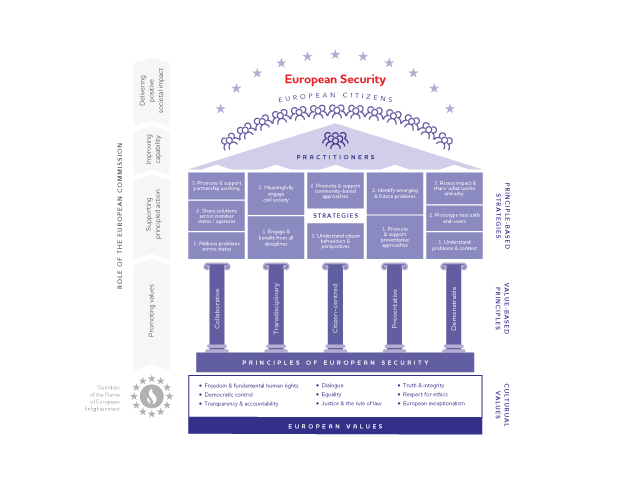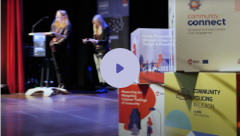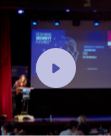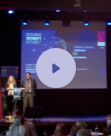|
|
|
|
| Welcome to the sixth issue of VACCINE - the CCI Newsletter |
|
| We hope that you are well and welcome you to the final newsletter of the Cutting Crime Impact project. Looking back on the past 39 months of CCI, it has been a long and sometimes challenging journey (particularly due to unwelcome complications courtesy of Covid!). |
|
| We started back in 2018, with research to better understand the context, needs and requirements of our six LEA partners. We explored the insights emerging from this work, developing multiple concept ideas and potential solution directions. Then, after extensive prototyping with stakeholders and end-users, eight CCI Tools were successfully produced. We believe CCI aptly demonstrates that effective Tools and solutions addressing practical security issues can be developed and implemented with the right approach. |
|
| We are convinced that the human-centred design approach adopted by CCI has been fundamental to its success. But we must remember that design success requires a certain mind-set; a particular attitude — a way of thinking and working. CCI's success is down to the commitment of our great consortium members and how well we all worked together. |
|
| And CCI asked a lot from our LEA partners! They received a crash-course in human-centred design research and innovation and had to follow a structured design process to successfully develop their tools. This meant LEAs had to undertake design research - looking objectively at working practices in their organisation; asking difficult questions, identifying problems and confronting any organisational shortcomings that were revealed. Such critical reflection is not easy — and in fact may often be discouraged! |
|
| LEA researchers had to develop mock-ups of their Tool designs, to physically prototype and test them. They also had to develop communication material to clearly 'pitch' their Tools to potential end-users, managers and other decision-makers to gain their buy-in and support for Tool implementation. |
|
| In terms of skills, we're talking about the ability to research and think divergently, as well as the capability to develop, launch and promote a finished product. A product that will be acceptable and taken up because it meets end-users needs and, basically, is well-designed. |
|
| We hope that CCI has helped partners broaden their capability — that the skills and insight into the human-centred design process the project has provided will be useful to them in addressing problems in the future. We've certainly learned a lot from working together in such a hands-on manner. |
|
|
|
|
|
|
|
You can hear directly from consortium members a little about what they learned from CCI in a short video. |
|
|
| These are comments given during interviews with partners conducted by LOBA and DPT at the final CCI conference in Brussels. |
|
|

|
|
play video |
|
|
|
|
|
|
|
|
| We do hope you have enjoyed reading our newsletters over the past three years of CCI, and that you've found the various CCI findings and outputs relevant to your own work. While the CCI project will officially finish on 31 December 2021, the CCI consortium will continue to promote the outputs we have produced and monitor impact. In the meantime, we hope you have a lovely Christmas and a happy New Year! |
|
| Best wishes, |
| The CCI Consortium |
|
|
|

|
|
|
| About the Cutting Crime Impact (CCI) Project
|
|
|
|
|
|
| The CCI project addresses high impact ‘petty crime.’ This is defined as non-organised crime taking place against people or property in towns and cities. This type of crime has a significant negative impact on European citizens’ quality of life, community cohesion and the safety and security of the urban environment. Those living in deprived neighbourhoods and vulnerable groups are often the most seriously affected. |
|
| The CCI project seeks to support Law Enforcement Agencies (LEAs) and security policymakers in adopting a preventative, evidence-based and sustainable approach to tackling high-impact petty crime. |
|
|
|
|
|
|

|
|
|
| The CCI Tools for Law Enforcement Agencies |
|
| CCI supported LEAs in researching and innovating practical, evidence-based tools that meet end-users needs and operational contexts. By considering the ethical, legal and social issues throughout the project's research and innovation activities, Tools have been developed in the four CCI Focus Areas that promote safety and security without compromising fundamental human rights. |
|
| We're very proud of what CCI has produced. Using the CCI human-centred design approach, each Tool was developed by the LEA, for the LEA. This means each Tool is bespoke to the LEA that developed it. It's in their language, uses their branding, addresses their specific problems or concerns, and functions in a way that fits the particular operational context of that LEA. |
|
| We're just finished putting the finishing touches to a series of bespoke 'web portals' for each of the CCI Tools. These provide a platform from which you can find out more about the Tools' development and implementation, download them and share them with colleagues. |
|
|
|
|
|
|
|
|
|
|
|
|
|
|
|
|
|
|

|
|
| |
|
| National Police of the Netherlands (NPN) |
|
|

|
|
| |
|
| Lower Saxony State Office of Criminal Investigation (LKA) |
|
|
|
|
|

|
|
| |
|
| Greater Manchester Police (GMP) |
|
|

|
|
| |
|
| Lisbon Municipal Police (LMP) |
|
|
|
|
|
|
|
|
|
|
|
|
|
|
|
|
|
|
|
|
|
|

|
|
| |
|
| Greater Manchester Police (GMP) |
|
|

|
|
| |
|
| Estonia Police and Border Guard (PJP) |
|
|
|
|
|
|

|
|
| |
|
| Departament d'Interior - Generalitat de Catalunya (INT) |
|
|

|
|
| |
|
| Lower Saxony State Office of Criminal Investigation (LKA) |
|
|
|
|
|
|
|
|
|
|
|
|
|
|
| |
|
| The European Security Model |
|
| The EU-funded Horizon 2020 project Cutting Crime Impact (CCI) undertook to develop an extended version of the European Security Model that included consideration of so-called 'petty crime'. The need for such a model was identified in the original EU funding call. However, research undertaken through literature review and interviews with security policymakers and experts to identify the European Security Model, revealed that such a model did not in fact exist — despite being referred to in several documents. |
|
| Having identified this gap in the security policy literature, the CCI project undertook to analyse the shape and nature of said gap. Through structured workshop activity with consortium and advisory board members, CCI researchers designed and prototyped a European Security Model. The Model was launched at the Designing Security Futures conference in Brussels on 25 November 2021. |
|

|
|
| The Model considers fundamental values upon which approaches to security are based. Such values are variously described in EU treaties, charters and publications. In essence, public administration (including law enforcement) in the EU and its member states is bound by the rule of law, has the objective to promote human dignity (as detailed further through individual fundamental rights and freedoms), and is controlled by the people — organised in a system of representative democracy. To the list of values, CCI added 'European exceptionalism'. This value is related to "the European idea" (l'idée d'Europe) associated with political values derived from the Age of Enlightenment. It is the premise that European values are culturally framed by a unique, shared historic perspective dating back to the renaissance, one that is distinct from other (e.g. North American) perspectives, and is of value in itself. |
|
| Research undertaken by the CCI project identified five 'Principles of European Security' that follow from the European Values: |
|
|
|
|
|
|
|
| The Model identifies a number of actions related to each principle - actions that serve to support practitioners in delivering safety and security to European citizens. |
|
| The European Security Model serves a number of functions, including presenting a coherent framework for European security strategies in the context of value-based principles and principle-based action. |
|
|
|
|
|
|
|
More information about the CCI European Security Model can be accessed here: |
|
|
| |
|
| Presentation at the Designing Security Futures conference |
|

|
|
|
| |
|
|
| Briefing Paper |
|

|
|
|
|
|
|
|
|
|
| |
|
| CCI Conference “Designing Security Futures” |
|
| 24-25 November 2021 |
|
| On 24-25 November 2021, CCI held its final conference in Brussels - Designing Security Futures. This conference would not have been possible without our great organising team, comprising Deutscher Präventionstag, Efus and LOBA. We are very grateful for their positive attitude and practical support in the face of multiple challenges - not least from Covid. |
|
| The Opening Keynote Speaker was Mr Andrea De Candido. Mr de Candido works for the Directorate General for Migration and Home Affairs of the European Commission, where he is the Acting Head of the unit "Innovation and Security Research" and responsible for exploitation of results and outputs from security research. His Unit drafted the security research programme within the overall EU Research & Innovation Framework Programme - or Horizon Europe, as it is commonly known. |
|
| Drawing on the approach adopted during CCI by the six law enforcement agencies (LEA), attendees learnt about adopting a human-centred innovation approach in the security context. Speakers explored how the approach enables problem framing (so the right problem is being tackled), ensures feasibility (so solutions perform as intended) and improves implementation - so solutions suit the identified user group and context (be they police officers, policymakers or citizens). |
|
| Designing Security Futures explored and discussed the results of CCI with presentations of the eight tools developed by LEA project partners in the areas of Predictive Policing, Community Policing, Crime Prevention through Urban Design & Planning (CP-UDP) and Citizens' feelings of insecurity. |
|
| Finally on Day 1, Anno Bunnik from Rijksuniversiteit Groningen in the Netherland highlighted how CCI had addressed ethical and social issues throughout the project. |
|
| On Day 2, our Keynote Speaker was Johannes de Haan, Crime Prevention and Criminal Justice Officer at the United Nations Office on Drugs and Crime (UNODC). Mr Haan supports the work of the United Nations Commission on Crime Prevention and Criminal Justice. He is involved in identifying and promoting promising practices in the field of crime prevention – with a particular focus on community-based crime prevention.
The conference then addressed security policy at the EU, state and local levels, with Professor Caroline Davey and Andrew Wootton of the University of Salford presenting a new European Security Model. Paul van Someren of DSP-groep provided an overview of lessons learned from CCI - and what it might mean for policymakers. |
|
| Elizabeth Johstone, Executive Director of the European Forum for Urban Security (Efus) gave the closing speech, providing insight into the relevance of CCI to local and regional authorities across Europe. |
|
|
|
|
|
|
|
In case you missed the conference, here are some of the highlights: |
|
|
|

|
|
|
|
|
|
|
You can still watch the full conference on our YouTube channel: |
|
|
|
Day 1

|
|
Day 2

|
|
|
|
|
|
|
|
| |
|
| DPT CCI Webinars |
|
| During 2021, a series of practice-oriented online seminars were offered by Deutscher Präventionstag (DPT). These webinars presented the various Tools developed by CCI partners for the prevention of high-impact petty crime, and provided an overview of the innovative research and innovation approach adopted by the project. |
|
| All webinar recordings are now available: |
|
|
|
|
|
|
|
Innovating security solutions with human-centred design |
|

|
|
|
|
|
|
|
Promoting continuity in Neighbourhood Policing through human centred design |
|

|
|
|
|
|
|
|
|
|
|
Making the Case for a Community Policing Approach: Lessons from Lisbon Model |
|

|
|
|
|
|
|
|
Addressing Citizens' Feelings of Insecurity |
|

|
|
|
|
|
|
|
|
|
|
On the trail of citizens' feelings of insecurity |
|

|
|
|
|
|
|
|
Police analysis and communication tool to support effective information-enhanced patrolling |
|

|
|
|
|
|
|
|
|
|
|
The Dutch touch: a problem-oriented approach to High Impact Crime (ProHIC) |
|

|
|
|
|
|
|
|
CP-UDP in Estonia: Building Safer Cities Together |
|

|
|
|
|
|
|
|
|
|
|
The ProMIS Tool: Project Monitoring & Impact Support for CP-UDP |
|

|
|
|
|
|
|
|
Framing a European approach to security policy and practice |
|

|
|
|
|
|
|
|
|
|
| |
|
| CCI Factsheets and Practice Sheets and Policy Briefings |
|
| The CCI project has developed a range of materials to disseminate innovation and best practice around the four CCI Focus Areas and the Tools developed by CCI LEA partners. |
|
|
|
|
|
|
|
|
|
|
|
Factsheets |
|

|
|
|
|
|
Practice Sheets |
|

|
|
|
|
|
Policy Briefings |
|

|
|
|
|
|
|
|
|
|
|
|
|

|
|
|
| Some final words from the Consortium itself |
|
| Thank you for following the progress of the CCI project over the past few years — we hope the project has provided you useful insights and materials. |
|
| You can hear directly from consortium members a little about what they learned from CCI in a short video, here. These are comments given during interviews with partners conducted by LOBA and DPT at our final CCI conference in Brussels. |
|
|
|
|
|
|
|
|
